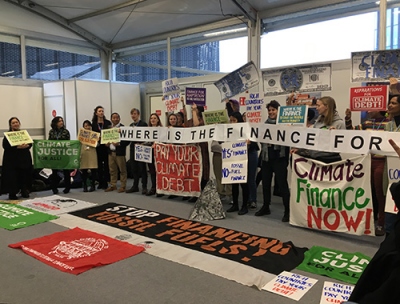A Bass Connections Class Goes to UN Climate Change Conference in Poland
December 28, 2018

In early December, a group of Duke students participated in the 24th Conference of the Parties to the United Nations Framework Convention on Climate Change in Katowice, Poland, where they got the chance to explore the intricacies of climate diplomacy and the future directions of environmental policy.
This visit was part of the U.N. Climate Change Negotiations Practicum, a Bass Connections course that gives students the opportunity to learn about international climate policy through hands-on experiences, guest lectures and, most importantly, a visit to the annual U.N. climate change negotiations, known as COP24.
In one of her blog posts for Duke to the UNFCCC, master’s student Dieynabou Barry described the event as more than just diplomatic conferences and party delegates deciding the terms of international climate agreements. “[COP24] provides a great opportunity to learn more about real and practical actions and initiatives that countries, development banks, NGOs and more are taking to tackle the large issues posed by climate change,” Barry wrote. “There are a diversity of topics ranging from climate finance, gender mainstreaming, loss and damage, ocean and coastal protection and civilization and cultural preservation.”

Duke University delegates Corey Sugerik, Cai May Tan and Paelina DeStephano at COP24. Photo: Tasfia Nayem
Held between December 2 and 15, 2018, COP24 served as a platform for parties to assess progress in dealing with climate change and negotiate the Paris Agreement. To prepare, students spent the fall semester studying the history of global negotiations, climate change policy and the current agenda of the United Nations Framework Convention on Climate Change. They also got involved with the international clients such as delegates, nonprofit organizations and government agencies, and part of their work was focused on a specific issue that COP24 would address.
“My attention may not have been brought to the topic [of fossil fuel subsidization], had it not been for one of my clients, the International Institute for Sustainable Development,” master’s student Amanda Ullman wrote. Ullman added, “I leave COP24 with a desire to explore the effects that reform of fossil fuel subsidies could have on our climate action and how countries could promote these reforms in a way that promotes benefits across communities.”
During COP24, students learned the hard way some of the most important lessons in climate diplomacy. One of such lessons taught them how exhausting negotiations could be.

“International climate negotiations are a fickle, artful, endurance sport,” Molly Bruce ’20 noted. “By the end of Week 2, members of the delegations and civil society representatives alike were visibly exhausted. Negotiators were locked in rooms until 2 a.m., 3 a.m., even 5 a.m., only to return early the next day and continue working to build consensus.”
As students observed the meetings, they saw both victories and losses.
“It was very interesting to be witnessing the United States of America hosting an event to promote coal, which was laughed upon by the international community of climate change enthusiasts,” Aashna Aggarwal ’19 wrote in her blog post.
Jacob Glasser ’19 had another observation regarding COP24. After attending a number of panels, press conferences, protests, lectures and releases of reports, he noticed there was a lot of dialogue, but a lack of explicit action plans. However, the conference’s drawbacks only fueled students’ desire to fight climate change and build diplomatic support for future environmental policies.
Master’s student Rosanne Lam wrote, “I am filled with eagerness to act and increase climate action. While the COP was inspiring, it is the translation of everything discussed at the conference to action at home that is most important.”
Learn More
- See other Bass Connections courses.
- Come to the Bass Connections Fair on January 22.
- Explore Bass Connections in Energy & Environment.
